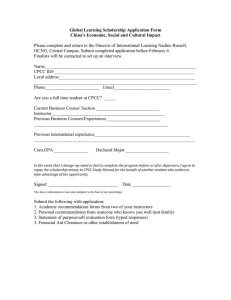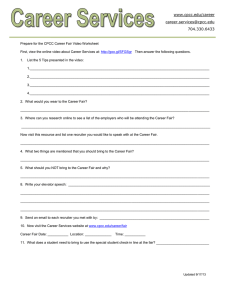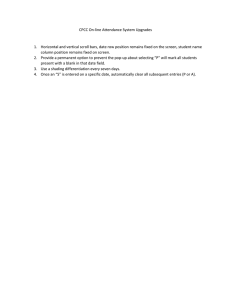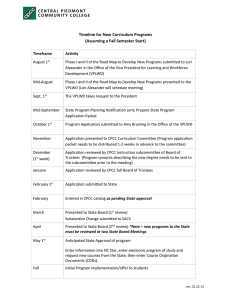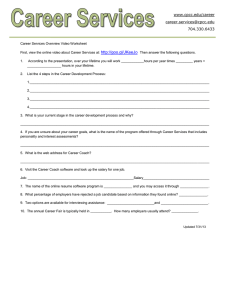Learning Unit Annual Objectives 2014-2015
advertisement
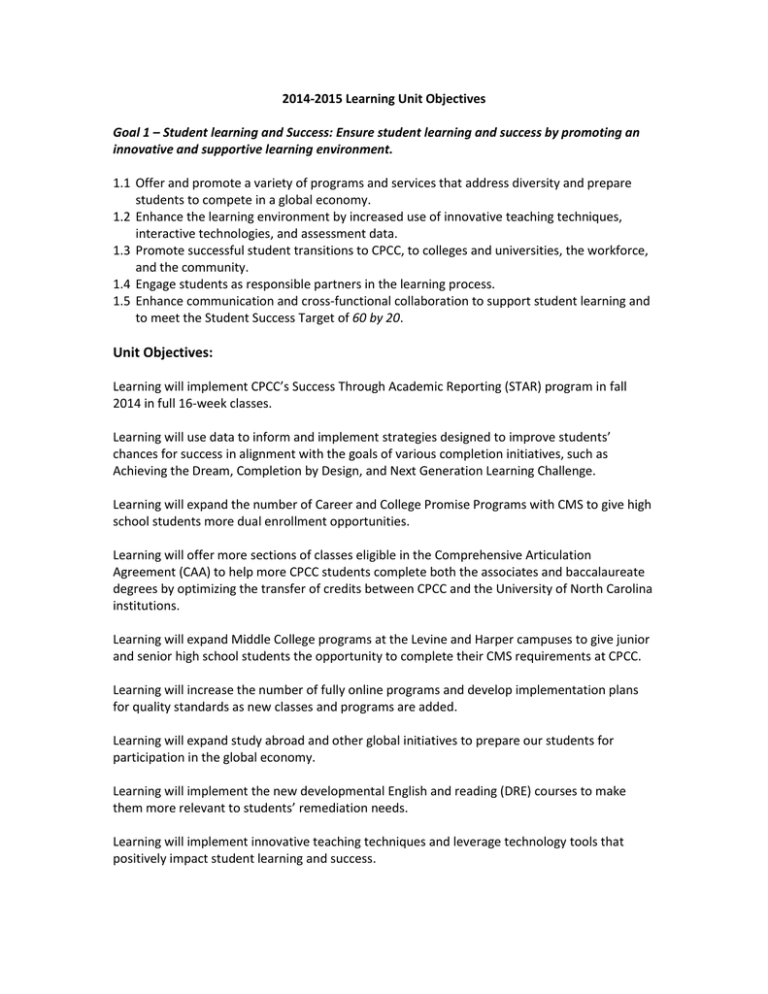
2014-2015 Learning Unit Objectives Goal 1 – Student learning and Success: Ensure student learning and success by promoting an innovative and supportive learning environment. 1.1 Offer and promote a variety of programs and services that address diversity and prepare students to compete in a global economy. 1.2 Enhance the learning environment by increased use of innovative teaching techniques, interactive technologies, and assessment data. 1.3 Promote successful student transitions to CPCC, to colleges and universities, the workforce, and the community. 1.4 Engage students as responsible partners in the learning process. 1.5 Enhance communication and cross-functional collaboration to support student learning and to meet the Student Success Target of 60 by 20. Unit Objectives: Learning will implement CPCC’s Success Through Academic Reporting (STAR) program in fall 2014 in full 16-week classes. Learning will use data to inform and implement strategies designed to improve students’ chances for success in alignment with the goals of various completion initiatives, such as Achieving the Dream, Completion by Design, and Next Generation Learning Challenge. Learning will expand the number of Career and College Promise Programs with CMS to give high school students more dual enrollment opportunities. Learning will offer more sections of classes eligible in the Comprehensive Articulation Agreement (CAA) to help more CPCC students complete both the associates and baccalaureate degrees by optimizing the transfer of credits between CPCC and the University of North Carolina institutions. Learning will expand Middle College programs at the Levine and Harper campuses to give junior and senior high school students the opportunity to complete their CMS requirements at CPCC. Learning will increase the number of fully online programs and develop implementation plans for quality standards as new classes and programs are added. Learning will expand study abroad and other global initiatives to prepare our students for participation in the global economy. Learning will implement the new developmental English and reading (DRE) courses to make them more relevant to students’ remediation needs. Learning will implement innovative teaching techniques and leverage technology tools that positively impact student learning and success. Learning will enhance the articulation and measurement of program-level student learning outcomes and utilize technology to better document evidence of student learning and accomplishments of Core4 competencies. Goal 2 – Organizational Learning and Development: Foster an organizational culture that maximizes individual growth through expanded learning opportunities. 2.1 Recruit, retain, develop, reward, and empower employees who are willing to share responsibility for student learning and success. 2.2 Ensure that part-time employees are engaged and supported in the learning environment at the College. 2.3 Facilitate a more collaborative and cohesive learning environment in line with the College’s vision, mission, and values. 2.4 Prepare employees to anticipate and respond appropriately to regional issues within a global framework. 2.5 Encourage the understanding, analysis, and interpretation of data to inform decision making. Unit Objectives: Learning will lead institutional efforts in the production of quality online learning opportunities through the integration of student support services with quality course design and delivery. Learning will continue to ensure effective and efficient operations of the College through management support and high-quality professional development opportunities for full-time and part-time faculty, administrators, and staff. Learning will continue to offer a comprehensive and consistent support system for part-time faculty. Learning will build a more cohesive organizational culture through enhanced working relationships with other units of the College. Learning will support and encourage faculty to keep abreast of new and emerging developments in their disciplines and fields. Learning will communicate with and engage faculty in support of degree completion initiatives and other state-mandated directives, such as the Comprehensive Articulation Agreement. Learning will support WTVI PBS through expanded instructional delivery options in the formation of a new division focusing on Digital Media, Journalism & Communication. Goal 3 – Community Catalyst: Be a catalyst for the educational and socio-economic development of the community through partnerships, coalitions, life-long learning, and civic engagement. 3.1 Expand partnerships with business and industry to determine the future high-demand job growth areas and the skills needed for those jobs. 3.2 Support relationships with business, industry, and educational partners to benefit existing and emerging workers. 3.3 Increase public knowledge of the educational opportunities and services at CPCC. 3.4 Respond to the vocational training and academic learning needs of an increasingly diverse community. 3.5 Provide expanded opportunities for high school students to pursue certificates and degrees that accelerate their learning and goal completion. Unit Objectives: Learning will pursue additional articulation and collaborative agreements with state and other institutions of higher education and other schools. Learning will build strategic alliances for workforce and economic development, especially with energy and high-tech manufacturing industry leaders in the Charlotte region to ensure an indepth understanding of workforce needs. Learning will continue to help facilitate a global economic vision for the Charlotte region. Learning will develop and implement new CCE programs in response to the needs of the community and the job market. Learning will expand community and/or business partnerships for apprenticeship programs, selfsupporting revenue generation, donations, and scholarship opportunities. Learning will expand outreach to dislocated workers and veterans through programs and recareering services. Goal 4 – Organizational Capacity to Serve: Plan and manage human, physical, Finance, and technological resources so that College programs, services, and infrastructure meet student and community needs. 4.1 Increase funding to provide educational opportunities for students. 4.2 Create and implement funding strategies to establish and sustain new educational programs. 4.3 Plan and manage growth to optimize organizational effectiveness. 4.4 Collaborate with business, education, and other organizations to secure needed levels of public and private support. 4.5 Promote the effective and efficient utilization of human, physical, fiscal, and technological resources to reinforce public trust. 4.6 Communicate the value and benefits of the College to increase community support. 4.7 Expand and manage facilities and operations in an environmentally and fiscally responsible manner. Unit Objectives: Learning will help implement the construction projects funded by the bond referendum by participating on campus construction teams to help plan for future growth of enrollment and programs. Learning will evaluate the impact of the new tiered-funding formula and optimize future class offerings. Learning will share resources, leverage efficiencies, and reduce costs across programs in response to the changing budget situation. Learning will implement the online process (Road Map to Develop New Programs) to develop new programs and ensure quality program feasibility, growth, and sustainability. Learning will strengthen internal processes to ensure student success and meet reporting requirements. Learning will increase data-informed decision making and prioritizing mission-critical needs, tasks, and projects on a regular basis. Goal 5 – Organizational Excellence and Innovation: Promote and sustain innovation, entrepreneurship, and excellence throughout the organization. 5.1 Expand the use of collaborative and cross-functional teams to innovatively respond to emerging needs. 5.2 Increase the use of strategies that measure outcomes and analyze results that improve organizational effectiveness and excellence. 5.3 Engage in continuous improvement through a culture of evidence to effectively measure efforts and increase positive outcomes. 5.4 Meet or exceed all State Accountability Measures which will impact performance funding. Unit Objectives: Learning will engage in activities that support the entrepreneurial college. Learning will research and pilot a competency-based approach to teaching and learning. Learning will seek industry support and funding to help underwrite start-up costs for new programs. Learning will assess and provide input on the new performance funding model and pursue grant opportunities. Learning will strive to meet or exceed all of the goals for the new state accountability measures which impact performance funding.
